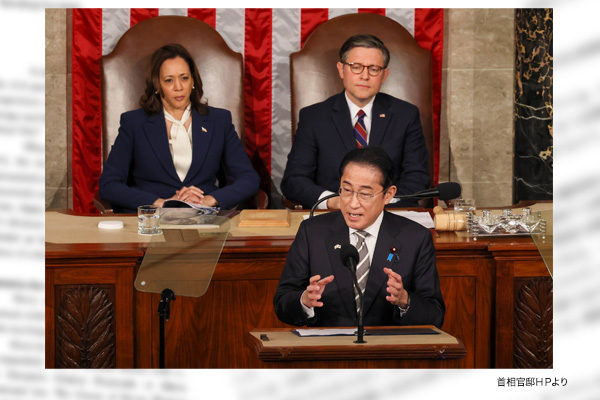“We are with you,” Japanese Prime Minister Fumio Kishida declared in his speech to the U.S. Congress on April 11. I strongly agree to Kishida’s assertion that Japan should be a “global partner” for the United States to protect the international order that respects freedom and the rule of law.
The question is whether Japan really intends to become a “global partner” for the U.S. What would Japan do if it were asked to join military actions against terrorist groups in the Middle East? Is it enough for Japan to provide only logistic support for U.S. forces in a Taiwan contingency? What would Japan do if it were asked by the U.S. to revise the Japan-U.S. Security Treaty into a reciprocal treaty not only for the U.S. to fight to defend Japan, but also for Japan to fight to defend the U.S.?
Amending Article 9 of the constitution is indispensable for Japan to fulfill its pledge to be with the U.S.in the military field. The necessary amendment is not the simple specification of Japan’s possession of the Self-Defense Forces as proposed by the ruling Liberal Democratic Party, but the amendment that enables Japan to fully exercise the right of collective self-defense. However, the actual debate on constitutional amendments has failed to make progress.
The government has the right to propose amendments
It was in 2000 when a Research Commission on the Constitution was established in each house of the Diet. In 2011, a Commission on the Constitution was launched to draft specific amendments. As for ordinary law amendments, the cabinet can submit bills to the Diet that may pass and enact them by a majority vote. On the other hand, as constitutional amendments are initiated by the Diet under Article 96 of the constitution, it has been generally thought that the amendment is lawmaker-led legislation requiring support from ruling and opposition parties and cannot be led by the cabinet or the ruling party.
In fact, however, the cabinet-led constitutional amendments are possible. In response to a question by House of Councilors member Hiroyuki Konishi, the government has decided on the following response at a cabinet meeting:
“Given that the cabinet is allowed to submit bills to the Diet under Article 72 of the constitution, we believe that the cabinet can submit draft constitutional amendments.” (May 16, 2017)
Reijiro Tsunoda, then director-general of the Cabinet Legislation Bureau, told the Diet as follows with regard to constitutional amendment proposals by the cabinet:
“Regarding the right to submit a proposal that becomes the basis for deliberation on the (constitutional) amendments at the Diet, I would like to distinguish this from the right to initiate and call it the right to propose. While it is natural for members of the Diet to possess the right to propose, it has been the consistent interpretation of the government that it also holds the right to make such proposals.” (House of Councilors Judicial Affairs Committee, December 18, 1980)
In line with this interpretation of the constitution, the “Constitutional Research Commission” was established in the cabinet in 1956 (and abolished in 1965). The cabinet can draft constitutional amendments and propose them to the Diet.
Path to a global partner
In order to achieve policy goals listed in the Japan-U.S. summit statement titled “Global Partners for the Future,” therefore, the Japanese government should establish a “Commission on the Constitution” in the cabinet to lead discussions on the relationship between the constitution and national security, including the revision of the Japan-U.S. Security Treaty.
Michio Ezaki is a member of the Planning Committee at the Japan Institute for National Fundamentals and a guest professor at Reitaku University.


